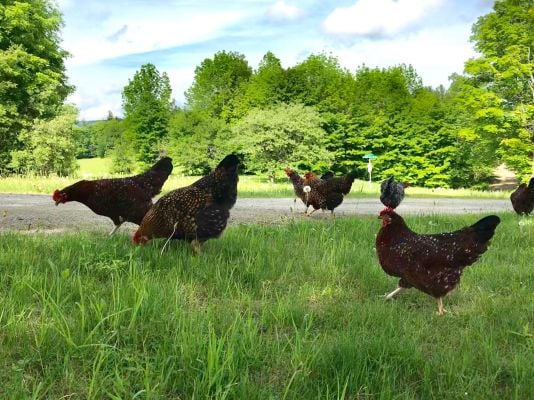deacons
Songster
I have 10 laying hens: three 5 year old Golden Laced Wyandottes and 7 year-olds (Silver Laced Wyandottes, Speckled Sussex, and Dominiques). They have all lived here since arriving as day old chicks. Currently, they have an 20'x25' screened run and free range a couple hours a day.
In mid-May, we're moving about an hour north to a new farm. The space we'll be setting up for their new run is an old equipment shed built off the back of our new horse barn. It needs a little work, but when we're done it will be very similar to their current set up, structurally.
I have three questions about getting ready for the move.
1. There haven't been animals on the new farm in years, and I'm not sure if there were ever animals on the ground where I'm planning to build the coop and run. Still, it's just a dirt floor in there right now. Is there something I should do to treat the ground before moving the chickens there?
2. In the spring- and after the worst of the mud- I usually deworm with horse Safeguard following a protocol I know a lot of people here use (one dose followed by another a couple weeks later). That would usually happen right around the time we're going to be moving. I'm not sure I want to stress their systems with dewormer, and stress them again with a move. And, since they'll be on new ground, would worming even be effective for the long run if done before the move? Would you wait to worm after moving or go ahead before?
3. I've never moved with chickens before, and these chickens have always lived in the same place. Is there anything else preventative I should be doing for them before or after the move? I know coccidiosis, for example, may be different strains on different properties. Do preventative treatment for that? My horses will be coming with us to the new farm, and they are currently boarded so the chickens have never been around them. So, we'll be introducing the chickens a new environment plus adding more livestock to the mix which I know may mess with their systems and immunities.
In mid-May, we're moving about an hour north to a new farm. The space we'll be setting up for their new run is an old equipment shed built off the back of our new horse barn. It needs a little work, but when we're done it will be very similar to their current set up, structurally.
I have three questions about getting ready for the move.
1. There haven't been animals on the new farm in years, and I'm not sure if there were ever animals on the ground where I'm planning to build the coop and run. Still, it's just a dirt floor in there right now. Is there something I should do to treat the ground before moving the chickens there?
2. In the spring- and after the worst of the mud- I usually deworm with horse Safeguard following a protocol I know a lot of people here use (one dose followed by another a couple weeks later). That would usually happen right around the time we're going to be moving. I'm not sure I want to stress their systems with dewormer, and stress them again with a move. And, since they'll be on new ground, would worming even be effective for the long run if done before the move? Would you wait to worm after moving or go ahead before?
3. I've never moved with chickens before, and these chickens have always lived in the same place. Is there anything else preventative I should be doing for them before or after the move? I know coccidiosis, for example, may be different strains on different properties. Do preventative treatment for that? My horses will be coming with us to the new farm, and they are currently boarded so the chickens have never been around them. So, we'll be introducing the chickens a new environment plus adding more livestock to the mix which I know may mess with their systems and immunities.


 I think I was more of a mess than they were
I think I was more of a mess than they were 





